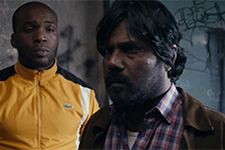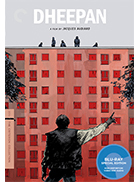Dheepan
|  Dheepan, which won the Palm d’Or at the 2015 Cannes Film Festival, opens in chaos, as we meet the film’s titular protagonist (Jesuthasan Antonythasan), a leader in the secessionist military group the Tamil Tigers, at the end of the 26-year Sri Lankan Civil War. Amidst the burning bodies of his comrades and the tumult of a refugee camp, he cobbles together a makeshift “family” in order to leave the war zone and emigrate to France. Taking on new names and identities, the newly rechristened Dheepan, his “wife” Yalini (Kalieaswari Srinivasan), and their 9-year-old “daughter” Illayaal (Claudine Vinasithamby) make it to Paris, where Dheepan at first tries to earn money selling glowing headbands and other assorted junk from an open suitcase to tourists, but eventually finds himself employed as the caretaker at a multistory banlieue on the outskirts of Paris. They try to keep to themselves, but they soon discover that they have entered another killing zone, this one ruled by competing gangs of drug dealers, who sometimes wage open war in the parking lot. Co-written and directed by Jacques Audiard, who previously won the Grand Prix at Cannes for his violent, but thoughtful crime epic A Prophet (2009), Dheepan is a consistently absorbing portrait of the struggles faced by immigrants, especially in terms of one’s identity. Just to survive, Dheepan, Yalini, and Illayaal must assume new names and backstories, pretending to be a family that they are not and, especially in Dheepan’s case, hiding his backstory. They stay together in order to earn permanent residency, a tenuous bond that is tested numerous times as Yalini is tempted to leave to be with a cousin in London, a move that would put them all at risk. Yet, at the same time, as they pretend to be a family, they begin to develop real connections; in other words, in playing family, they actually become one. In the eyes of the French, Dheepan becomes simply the “caretaker,” yet another dark-skinned immigrant worker who is all but invisible to the white residents of the banlieue. The drug dealers treat him contemptuously, unaware of his extensive background as a rebel military leader and man of violence (it is crucial, in this regard, that we do not see him enacting violence in Sri Lanka; rather, the film begins at the end of that tenure). For his part, Dheepan must keep his head down lest he risk blowing his cover story as a victim on the civil war, rather than one of its primary warriors, a proposition that becomes more and more strained as life in the banlieue becomes more and more dangerous. While Illayaal goes to school to learn the French language and culture, Yalini is recruited by Youssouf (Claudine Vinasithamby), the man who got Dheepan the caretaker job, to cook for and look after Monsieur Habib (Faouzi Bensaïdi), who suffers from some kind of cognitive disorder. It turns out that Habib, who is like the world’s tallest, most gentle, and quiet child, is the uncle of Brahim (Vincent Rottiers), a gang leader who has recently been released from prison and is looking to reassert his position in the drug trade (as A Prophet made clear, Audiard views the prison system not as a place of reform, but rather a place where criminality is fine-tuned and hardened). Thus, Dheepan, Yalini, and Illayaal essentially find themselves trapped once again in a world of violence with nowhere to go. It’s not that the war follows them (although a former comrade of Dheepan’s, who is also hiding in Paris, tries to draw him back into the struggle), but that they tragically stumble into a new one that, at some point, Dheepan must engage because it threatens the people he now sees as his family. Audiard, perhaps mining Hitchcock (although he has cited Sam Peckinah’s Straw Dogs as a primal influence), structures much of the film around characters watching and looking, which we see subtly when Dheepan first scans the banlieue, the practice of a seasoned fighter used to living in constant danger, and more directly when Yalini watches wide-eyed through a window while drug-fueled violence unfolds, reflected in the window through which she looks. Shot in a largely naturalistic style by cinematographer Éponine Momenceau (making her feature-film debut), Dheepan is both a well-honed exercise in genre filmmaking and an impressively astute film of our moment. With the news awash in stories of violent conflict and refugee crises all around the world and the rising prominence of xenophobic political leaders in both Europe and the U.S. who stake their power on reactionary nationalism rooted in the demonization of Third World “others,” Audiard’s film puts a face on an epic problem that affects tens of millions of people, yet is all too often ignored by those who are not personally affected. Audiard has said that part of his inspiration for making the film was watching immigrants in Paris and wondering about their stories—where they came from, what lives they led before making their way to France, what they had to leave behind and who they had lost—questions that Dheepan answers in a way that is both compelling in terms of a specific set of fictional characters and revealing in terms of the larger, real-world problems the film depicts. Audiard, who cowrote the screenplay with previous collaborators Noé Debré (Les Cowboys) and Thomas Bidegain (A Prophet, Rust and Bone), proves himself to be something of an optimist in the film’s denouement, perhaps in a way that some may find overly endearing given all that has transpired over the film’s previous 110 minutes. However, I would argue that he earns the film’s optimism through his careful attention to the struggles of immigration and recognition that even the best outcome must still contend with the history of violence and despair it has capped.
Copyright © 2017 James Kendrick Thoughts? E-mail James Kendrick All images copyright © The Criterion Collection | |||||||||||||||||||||||||||||||
Overall Rating: 


 (3.5)
(3.5)


